CROESO // WELCOME

Cynhadledd Arweinyddiaeth Myfyrwyr 2025
Student Leadership Conference 2025
19/09/2025




Cynhadledd Arweinyddiaeth Myfyrwyr 2025
Student Leadership Conference 2025
19/09/2025



19/09/2025
SU President / Llywydd UM


Cynhadledd Arweinyddiaeth Myfyrwyr 2025
Student Leadership Conference 2025
UMCB President / Llywydd UMCB


Cynhadledd Arweinyddiaeth Myfyrwyr 2025
Student Leadership Conference 2025
19/09/2025
VP for Societies and Volunteering / IL Cymdeithasau a Gwirfoddoli
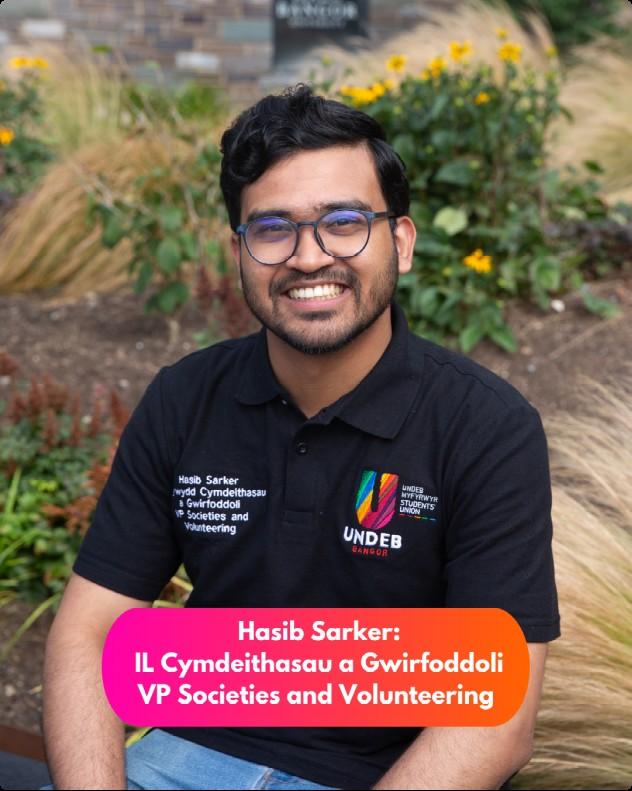

Cynhadledd Arweinyddiaeth Myfyrwyr 2025
Student Leadership Conference 2025
19/09/2025

VP Sport /IL Chwaraeon

Cynhadledd Arweinyddiaeth Myfyrwyr 2025
Student Leadership Conference 2025
19/09/2025
VPEducation / ILAddysg


Cynhadledd Arweinyddiaeth Myfyrwyr 2025
Student Leadership Conference 2025
19/09/2025
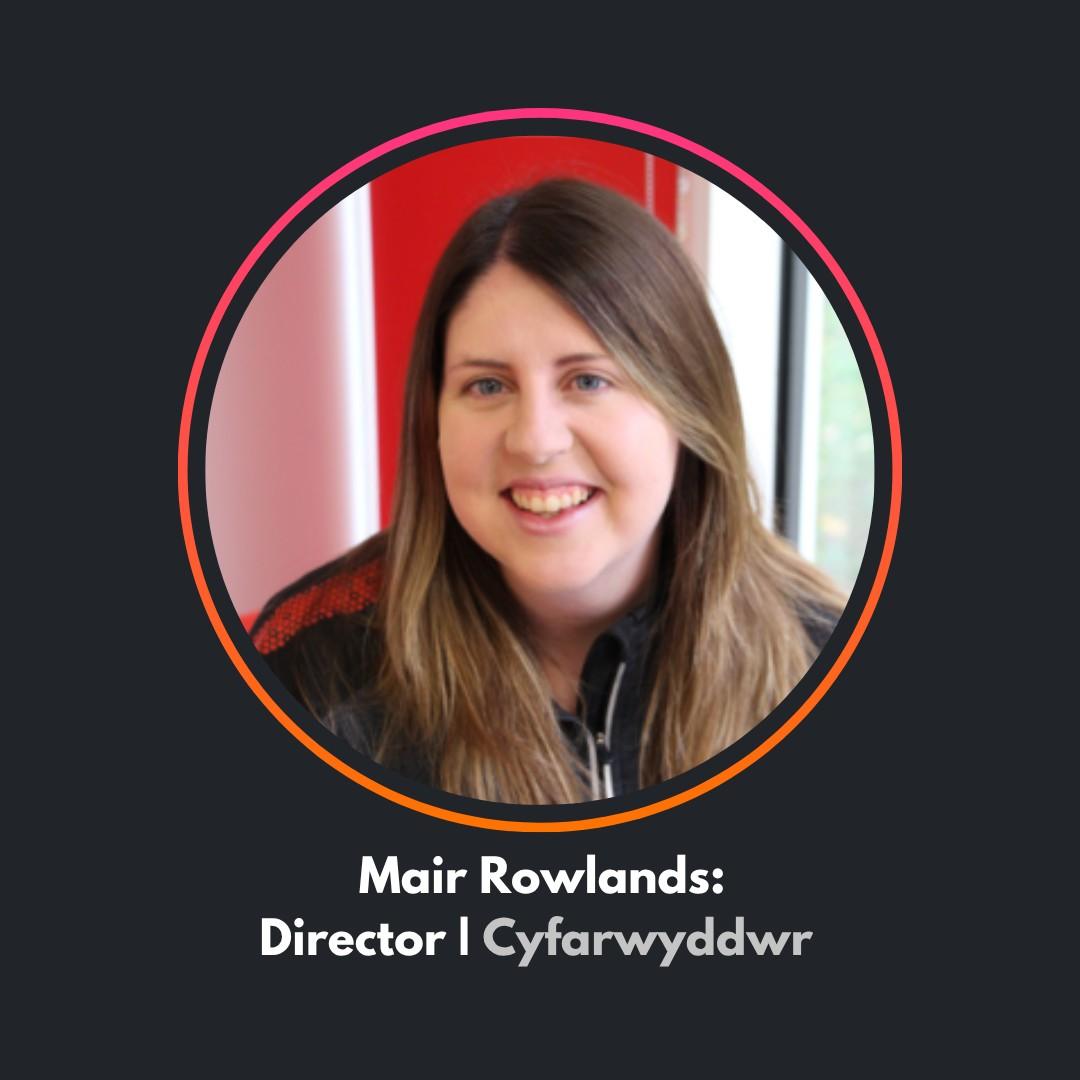






19/09/2025







Deall Camymddygiad Rhywiol, Trais ac Aflonyddu Cynhadledd. Understanding Sexual Misconduct, Violence and Harassment.
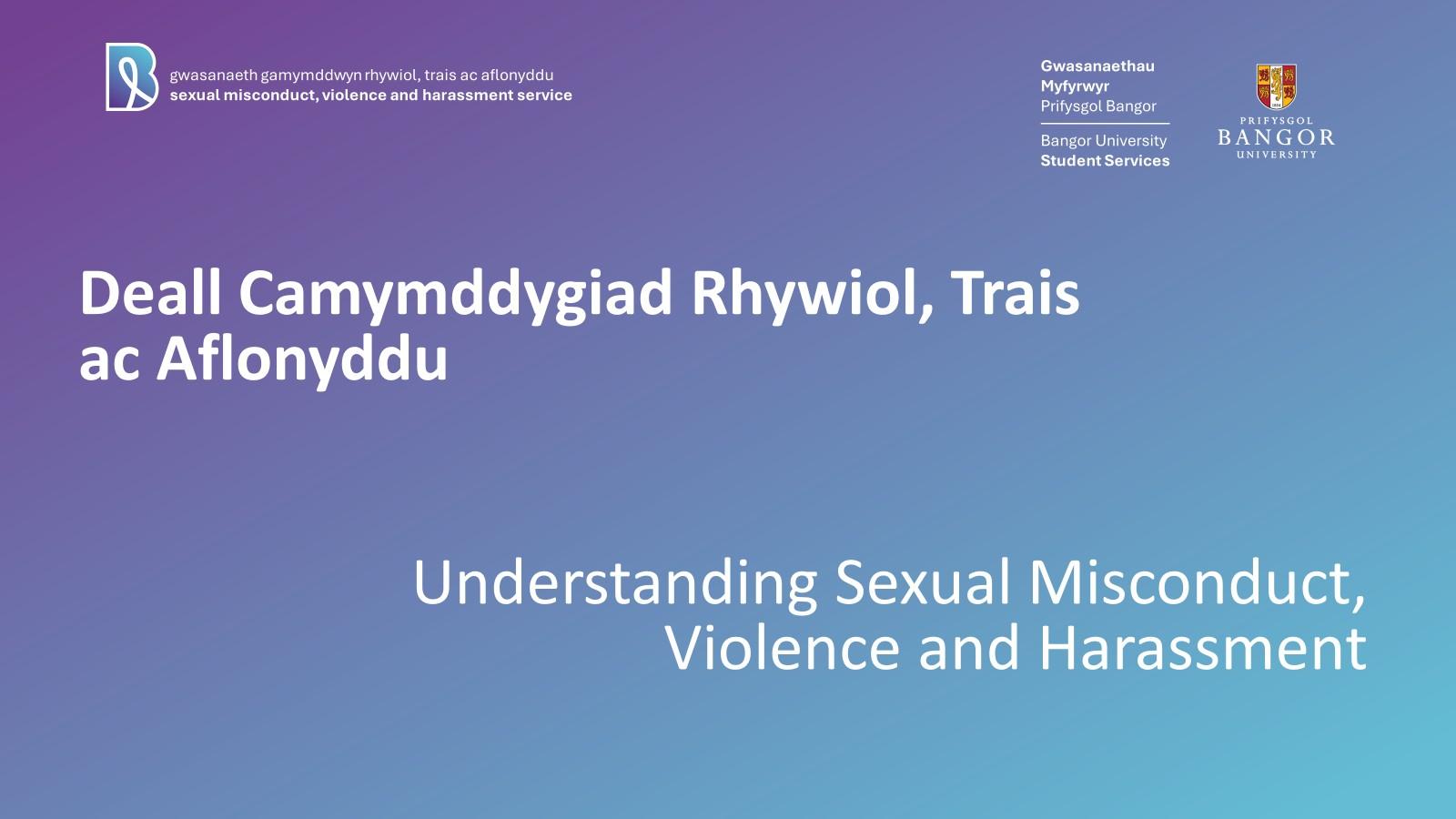











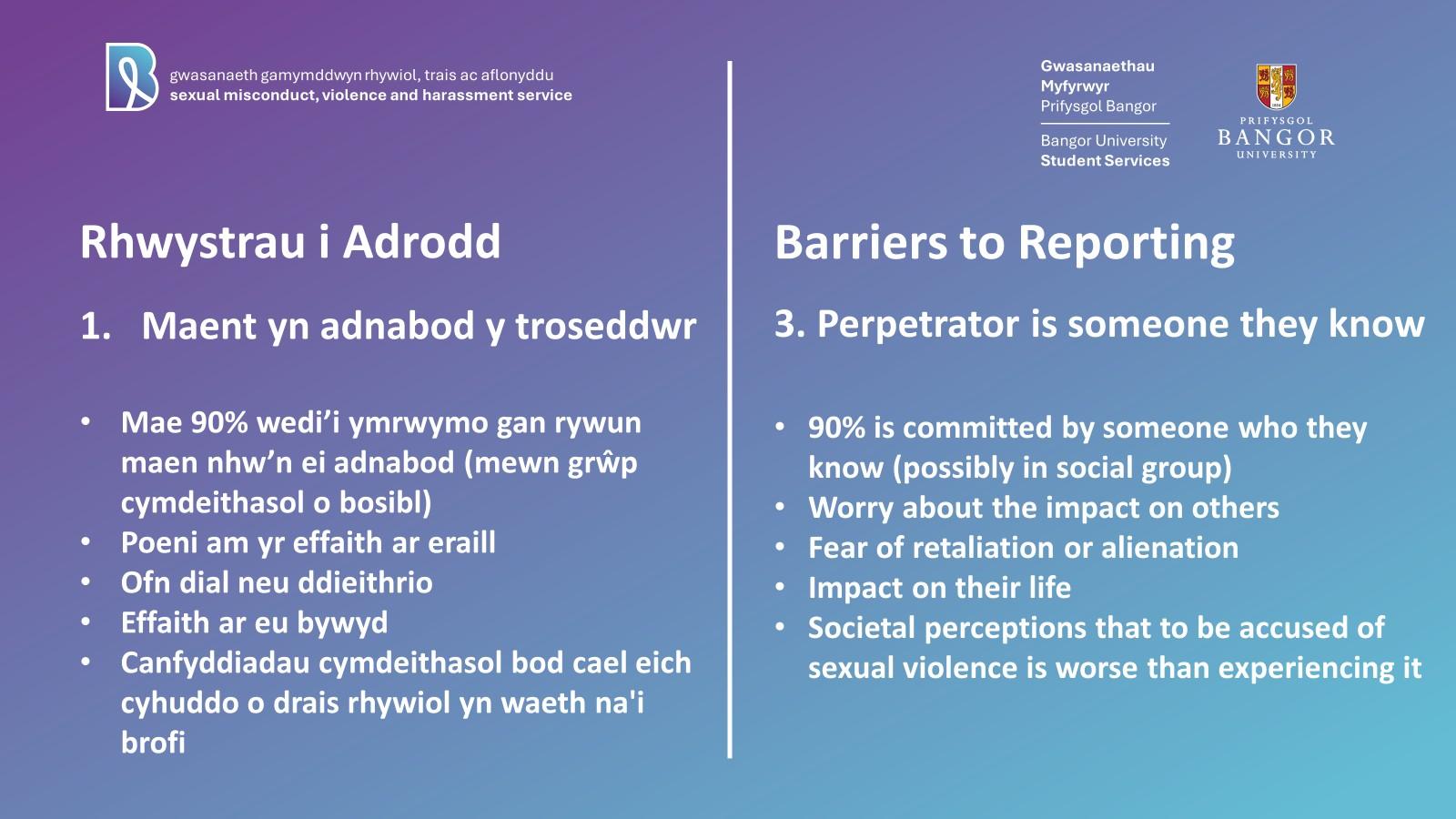



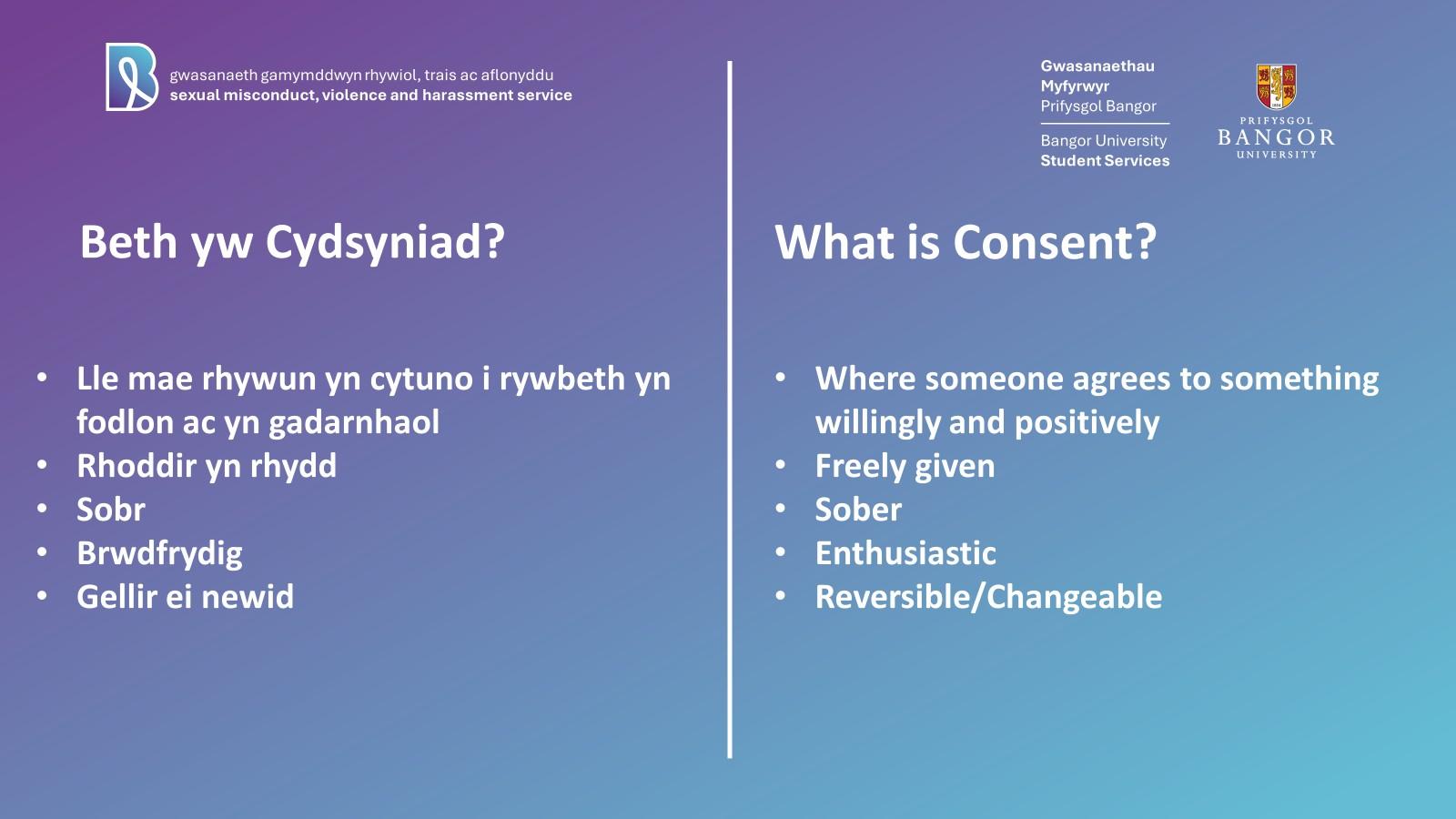
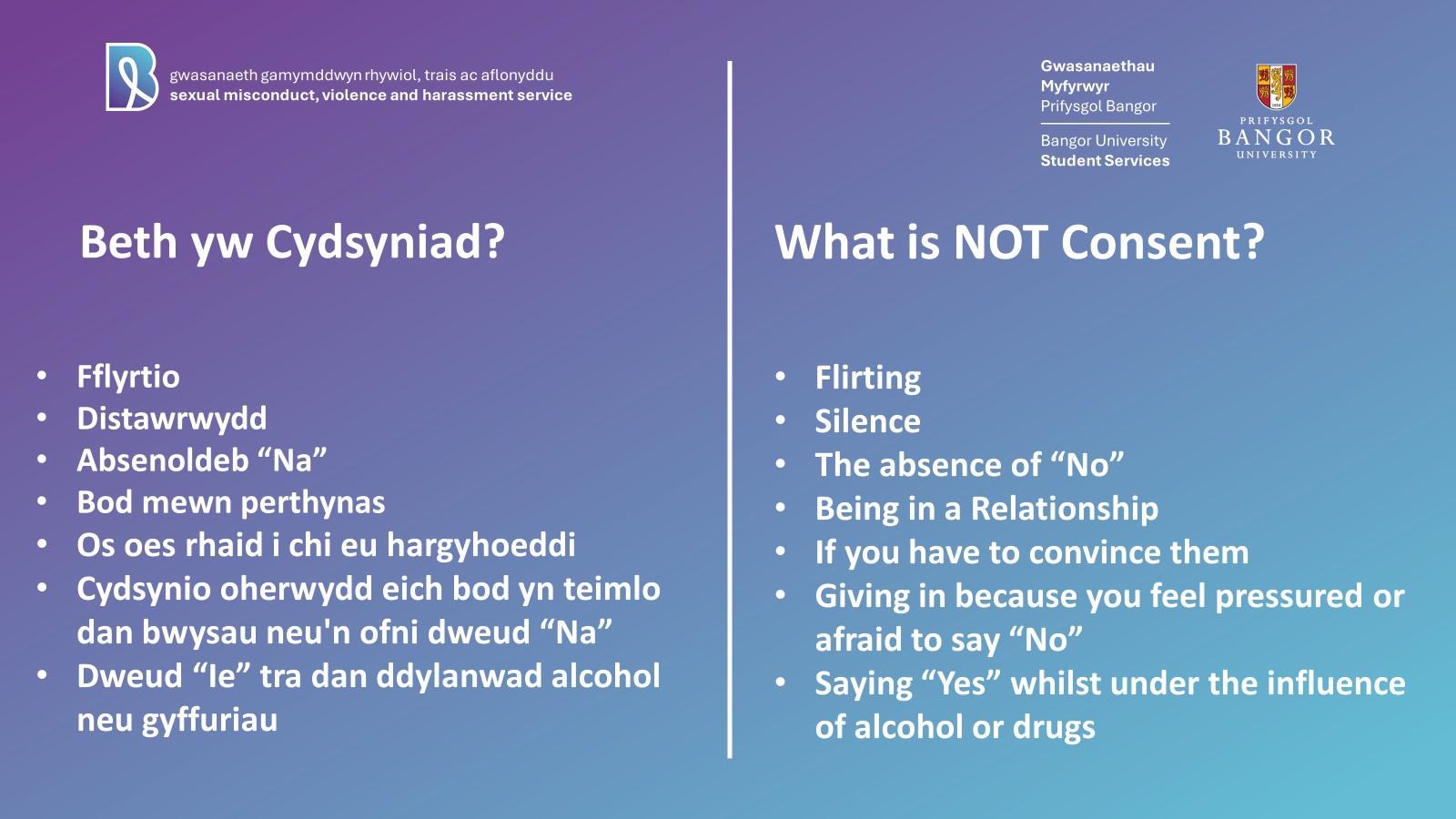


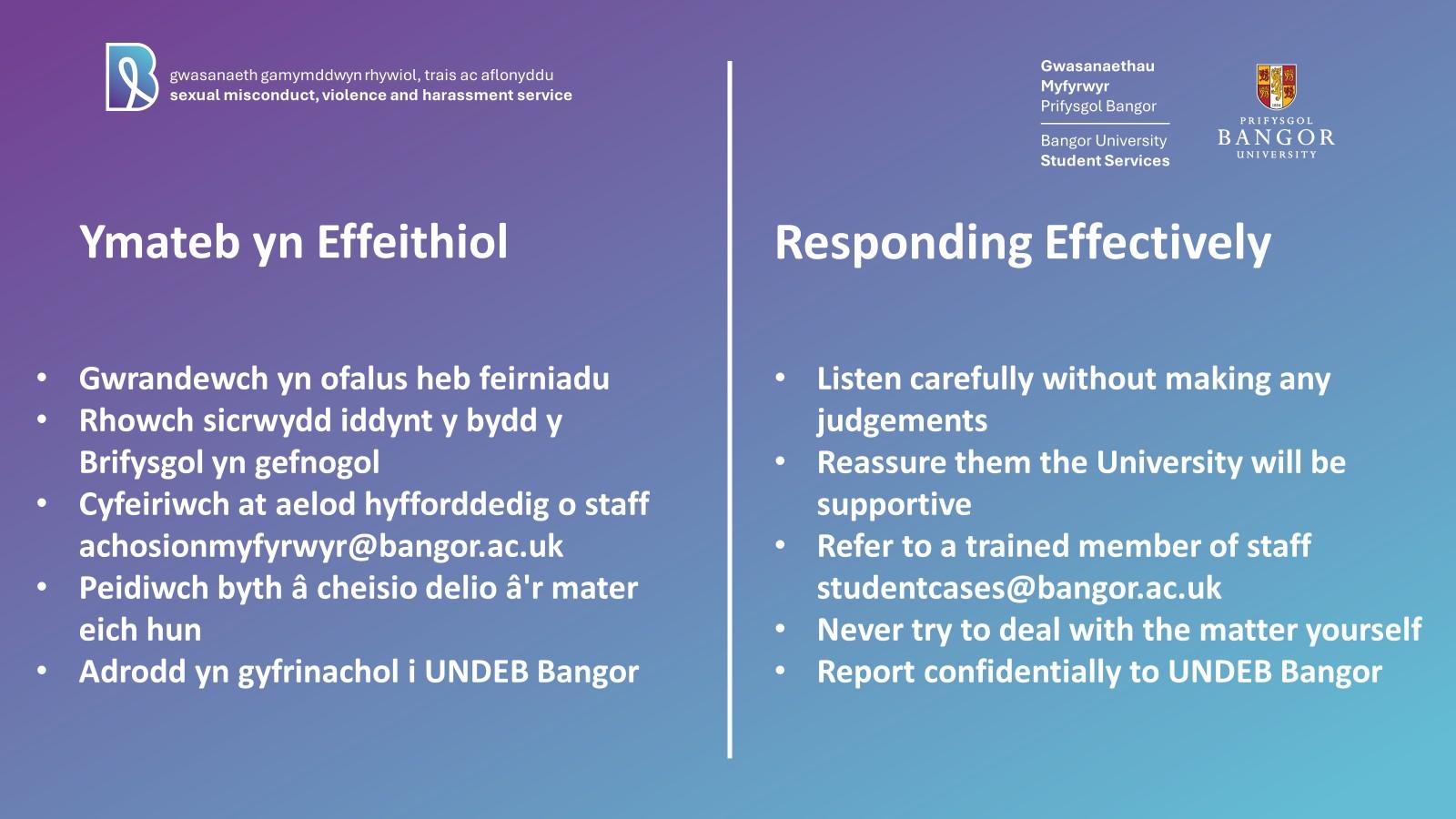
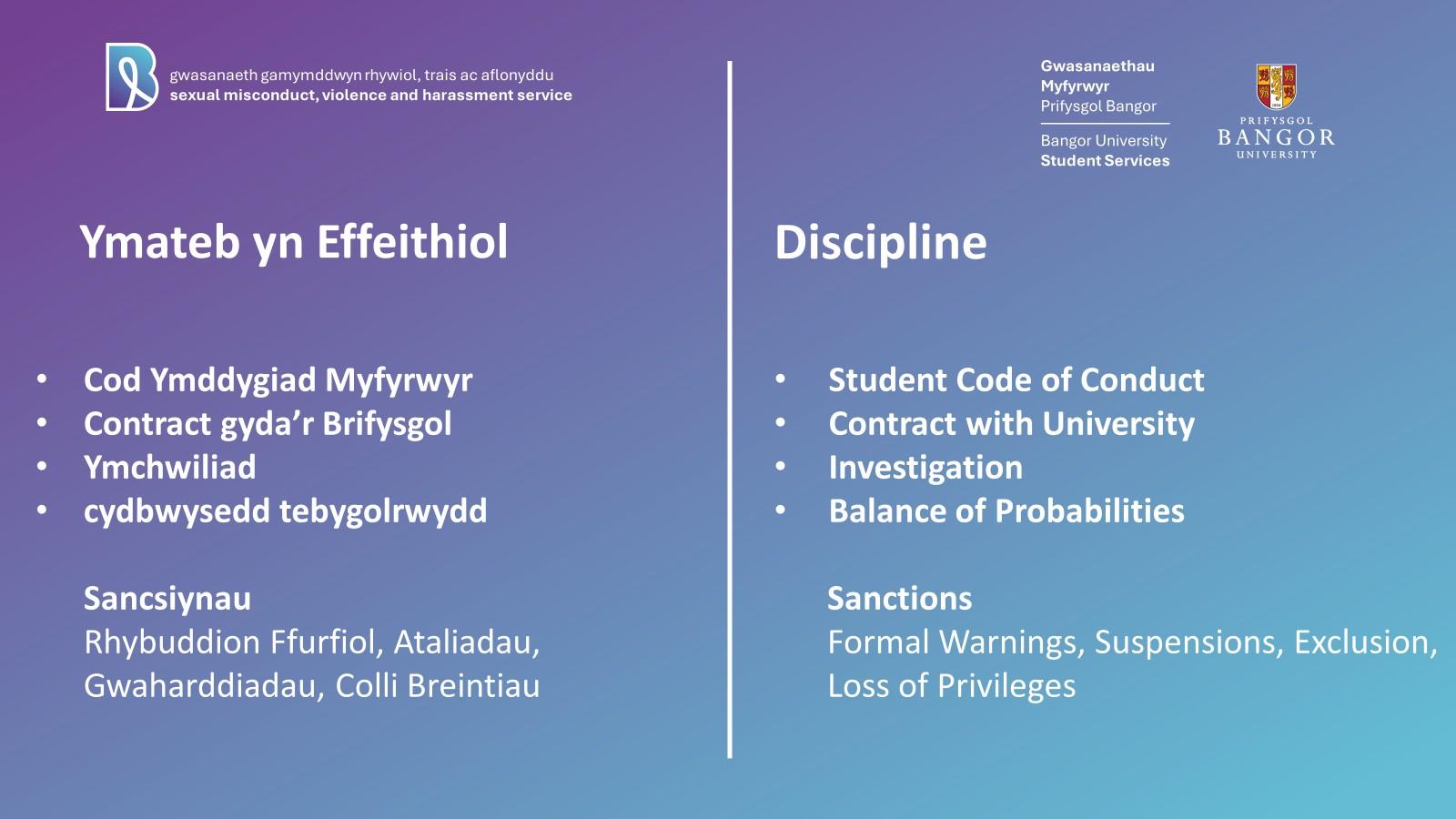

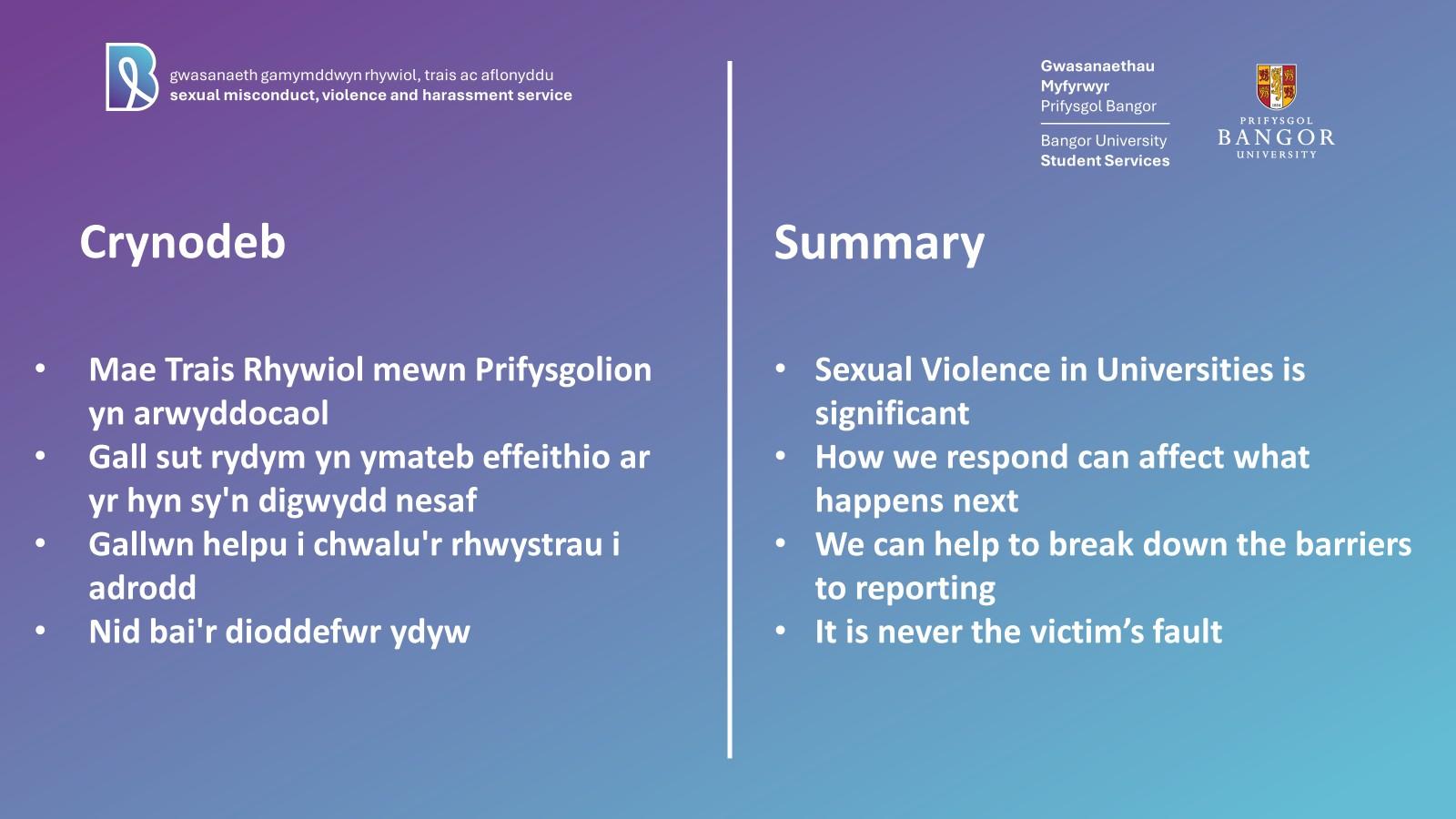


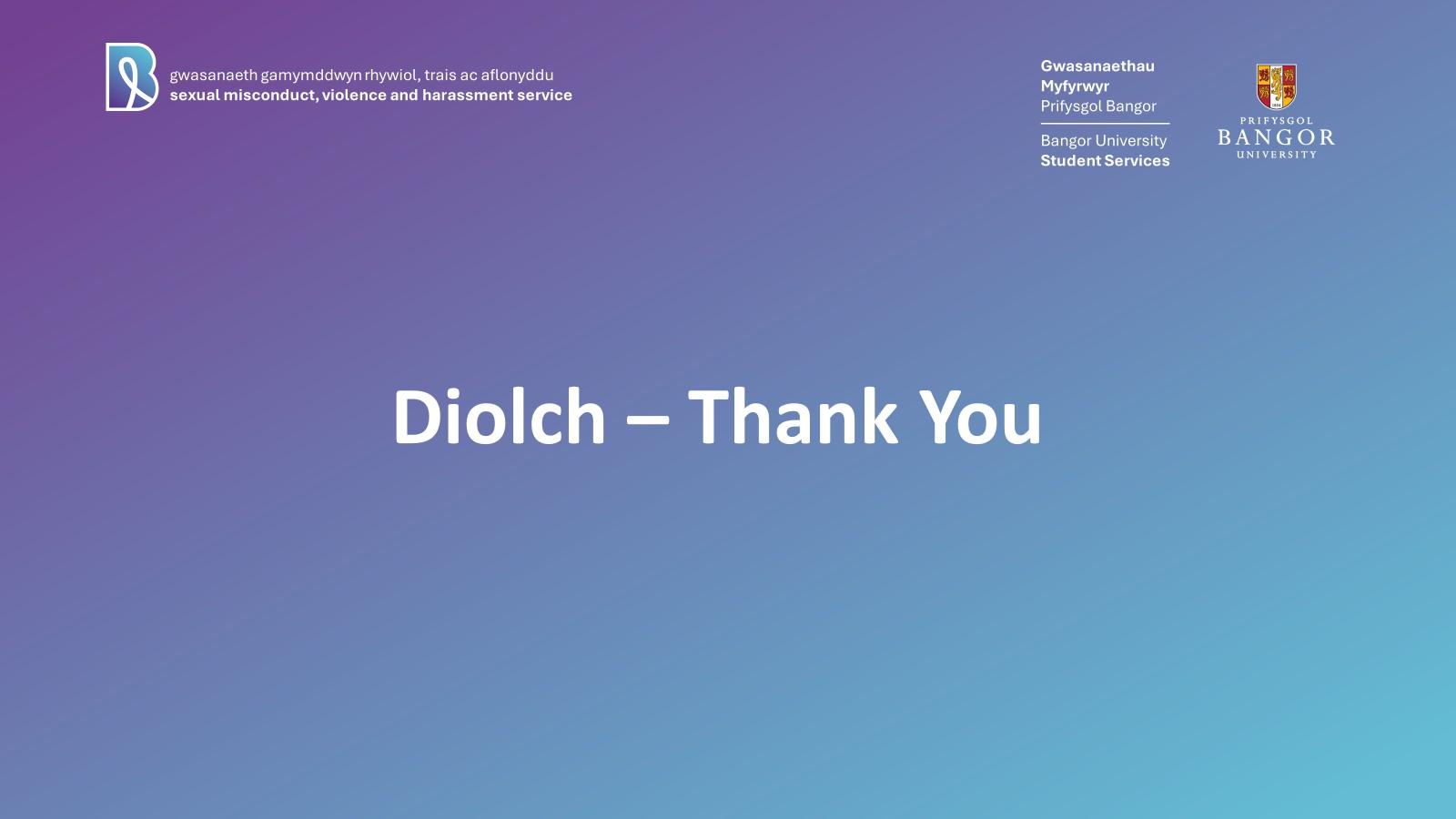

Wellbeing & Inclusivity Service 2025/26


At Bangor University, our Wellbeing and Inclusivity team are here to support your mental health, emotional wellbeing, and accessibility needs.
Below you’ll find information about the different roles within our team and the services we offer.
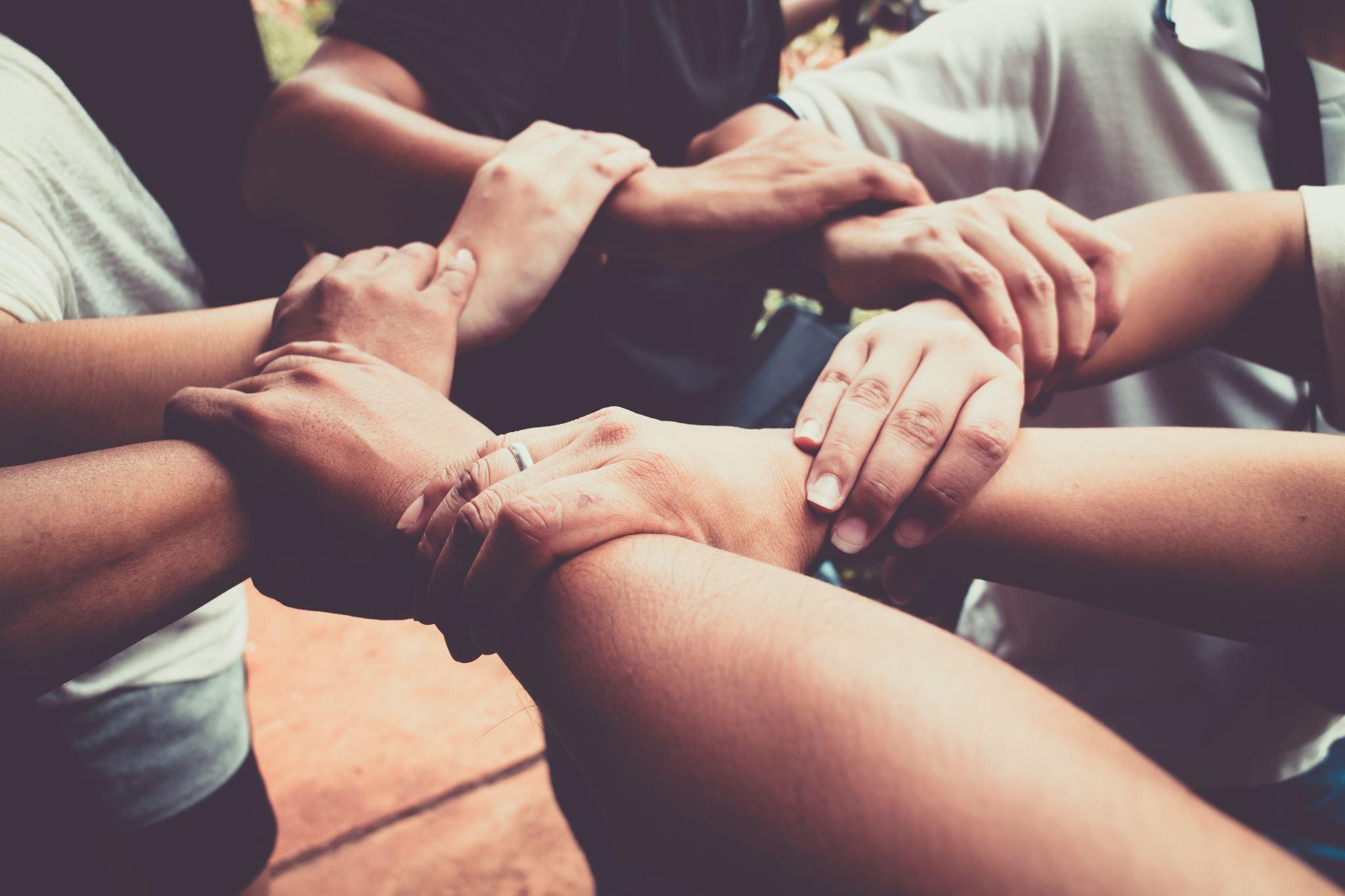
The Wellbeing and Inclusivity Team are based within Student Life at Bangor University. We offer confidential, 24/7 access to an external Student Assistance Programme through Health Assured. The next few slides will explain how to access this service and will include information on…
• Access Point
• Triage: Determining emergency vs. non-emergency needs.
• Support Options: Tailored interventions like counselling, mental health apps, and advisor referrals.
• Feedback & Evaluation: Student satisfaction and wellbeing tracking.
• Service Review: Continuous improvement through monthly reviews





24/7 Student Wellbeing
Helpline offer support with?


Bereaveme nt
Financial wellbeing
Relationshi p advice
Medical information
Family issues
Tenancy and housing concerns
Bullying
Harassmen t
Sexual and gender identity In the moment support
Alcohol issues
Drug issues
How do I contact the 24/7 Helpline?
Call: 0800 028 3766
Use the Wisdom App Wisdom can be logged into via a PC or laptop. Wisdom Online Login Download the app and Use Unique reference code MHA341687 Live chat available via the app


Is the student in distress and is the student needing urgent support?
YES Monday to Friday 9am to 5pm:
Contact the duty counsellor who will be based in the Student Hub
The duty counsellor will then assess and triage and ensure the student accesses the most appropriate support – this may direct to A&E or making an appointment with the Mental Health Advisor within the Wellbeing & Inclusion Service
Out of office hours call emergency services and notify security team 01248 382795 or extension 2795.and email the duty counsellor at: wellbeingservices@bangor.ac.uk
The student is wanting to talk to someone about their mental health or needing support but this is not urgent
YES
Support the student to access the 24/7 Student Assistance Programme





Check to see if the student would like information about the University Wellbeing & Inclusivity service `– provide details of how to register with the service: email
University life can be exciting and challenging. At Bangor University, the Wellbeing and Inclusivity Team within Student Life, supports your emotional and academic resilience. Our qualified team offers confidential help with mental health, wellbeing, and inclusion-related concerns. If stress, mental health, or other issues are affecting your learning, reach out early, we’re here to help you stay focused, motivated, and successful. The next slide outlines how to access our service and includes information on the following…
• Access Points: online referral wellbeing form, email wellbeing service, or drop into the student hub for information
• Triage: Determines emergency vs. non-emergency needs.
• Support Options: Tailored interventions e.g. referral to our external provider for counselling, mental health apps, and Wellbeing & Inclusivity Service Advisor referrals.
• Feedback & Evaluation: Student satisfaction and wellbeing tracking.





•

• Our Mental Health Advisers provide specialist support for students who:
• Are recovering from a mental illness
• Are experiencing new or ongoing mental health difficulties
• Have experienced a mental health crisis during university
• They offer:
• Mental health assessments
• Crisis prevention and support planning
• Advice on accessing mental health services


• Our mental health advisors work alongside the disability advisors and SpLD advisors
• We offer ongoing support, which may be linked to a Personal Learning Support Plan (PLSP)
• Support can be short-term or continue throughout your time at university, depending on your individual needs.
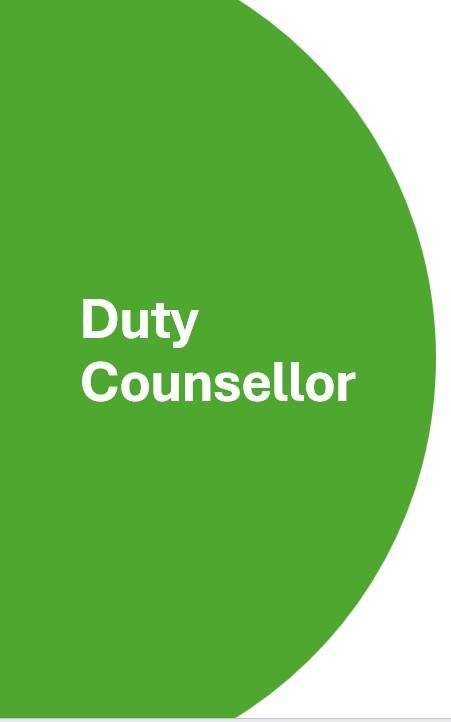
Our Duty Counsellors play a vital role in supporting the wellbeing of the university community. Acting as a key link between individuals in distress and the appropriate support services, they help ensure timely and effective intervention.
Based in the Student Hub 9am to 5pm Monday to Friday
Duty Counsellor is available to:
• Offer advice and emotional support
• Refer students to Mental Health Advisers
• Connect students with our 24/7 external Student Assistance Helpline
• Assess risk and determine the level of urgency
• Develop a safety plan with students
• Refer students or staff to the most appropriate internal or external support services
• This service helps maintain a safe, responsive, and supportive environment for both students and staff at Bangor University.

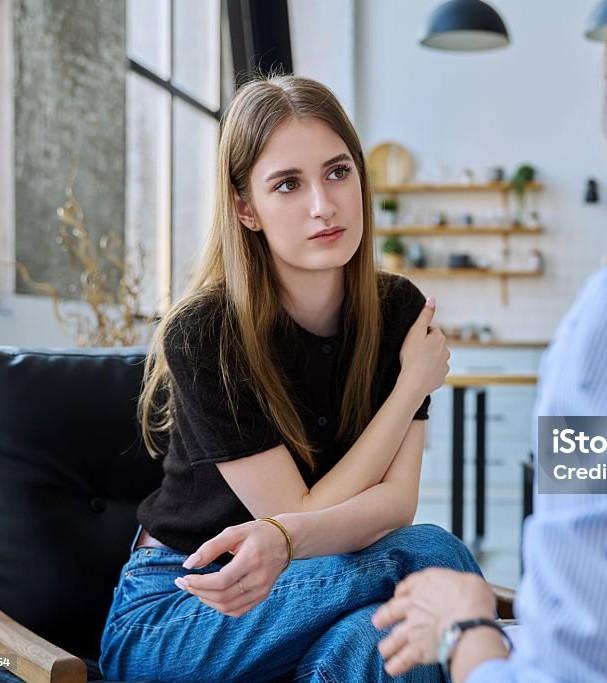
Our duty counsellors are also able to
• Provide counselling to students through the medium of Welsh
• Deliver workshops and courses
• Support the role of the Wellbeing Advisor in terms of mental health awareness raising and campaigns
• Debrief staff who may need to talk through any concerns in relation to a student

• Our Wellbeing Adviser offers practical and emotional support for students facing everyday challenges at university. Whether you're feeling overwhelmed, isolated, or simply need someone to talk to, they’re here to listen, guide, and help you manage your wellbeing.
• Uniquely, our Wellbeing Adviser is also a qualified Art Psychotherapist, offering:
• Creative, therapeutic interventions tailored to individual needs
• One-to-one art psychotherapy sessions
• Group sessions that encourage expression, connection, and wellbeing
• They also take a proactive role in promoting positive mental health, developing preventative initiatives and wellbeing campaigns to support the wider student community.


• They also take a proactive role in promoting positive mental health, developing preventative initiatives and wellbeing campaigns to support the wider student community.
• Common areas of support include:
• Homesickness and adjusting to university life
• Study pressures, time management, and academic stress
• Building resilience and maintaining general wellbeing
• The Wellbeing Adviser can also signpost you to relevant internal or external services, ensuring you get the right support when you need it.


A variety of wellbeing workshops are available to help students take care of their mental health and wellbeing.
Delivered by the Wellbeing Adviser, these sessions cover a wide range of topics and are designed to provide practical information, guidance, and strategies that you can use in your daily life.
The workshops aim to equip you with the knowledge and tools to manage stress, build resilience, and enhance your wellbeing during your time at university.
The atmosphere in these sessions is warm, welcoming, and supportive, giving you a safe space to learn and engage.

As well as running workshops and art therapy sessions, we also deliver tailored wellbeing activities for specific schools and colleges across the university. These sessions are designed to support students in different areas of study, making wellbeing support more relevant and accessible wherever you are.
We’re also actively involved in wider wellbeing campaigns and events throughout the year, including national days that raise awareness around mental health and wellbeing. You might see us on campus running activities, hosting stalls, or offering creative ways to get involved and learn more about looking after yourself.
Keep an eye out for us at events and around campus, and don’t hesitate to get in touch if you’d like the Wellbeing Adviser to work with your school, college, or society on a wellbeing activity or session. We’re always happy to collaborate and bring wellbeing support directly to where students are.
• Art therapy is a form of psychotherapy that uses creativity, such as drawing, painting, or making images, to help you explore your thoughts, feelings, and experiences. You don’t need any art skills to take part, it’s all about expression rather than producing “good” art, and the Art Therapist will guide and support you throughout.
• Art therapy can give students a safe space to manage stress, anxiety, or low mood, and it can be especially helpful if you find it hard to put emotions into words. It may support you in coping with academic pressures, relationship or family challenges, bereavement, or questions around identity and self-esteem. Many students also find it helps them build resilience, develop coping strategies, and gain greater self-awareness, which can make a real difference both during and after university.
What’s Available?
• You can access one-to-one art therapy sessions either in person or online, and there are also art therapy group sessions available at certain points in the year. Up to eight weekly one-to-one sessions are offered, usually between 9am and 1pm from Monday to Friday, with our part-time Art Therapist.
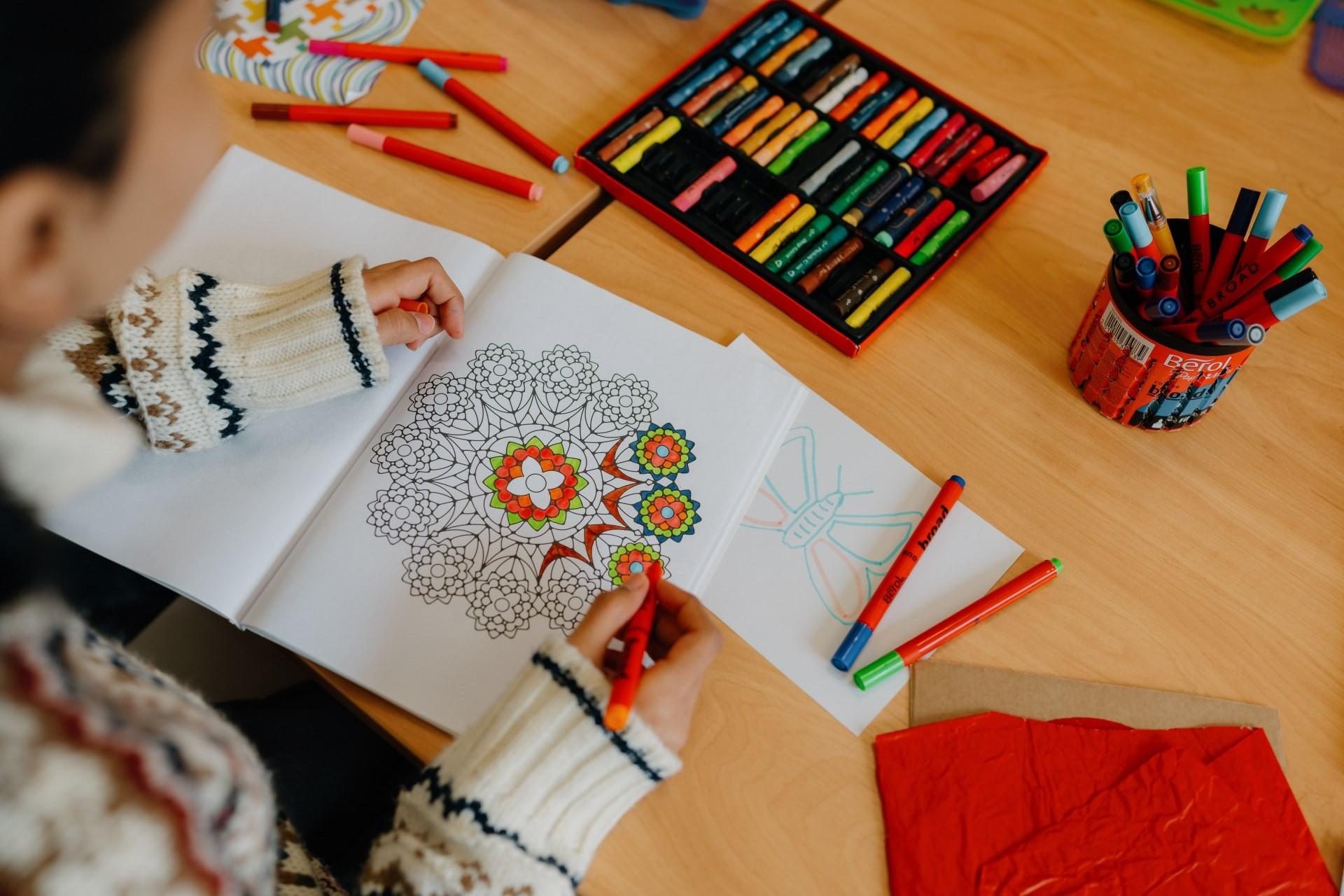
• NHS 111 (Option 2)
For urgent mental health support from trained professionals across Wales.
• C.A.L.L. Helpline – Mental Health Support for Wales
Confidential listening and information on mental health and related services.
�� 0800 132 737
�� Text ‘help’ to 81066
�� callhelpline.org.uk
• Samaritans – Available 24/7 for anyone in emotional distress.
�� 116 123
�� samaritans.org
• PAPYRUS – HOPELINE247
Support for young people struggling with thoughts of suicide.
�� 0800 068 4141
�� Text 07860 039 967
�� papyrus-uk.org


• Mental Health & Student Wellbeing Resources
• Mind UK Information and support for all mental health conditions.
�� mind.org.uk
• Student Space Free mental health resources specifically for students.
�� studentspace.org.uk
• Myf.cymru Welsh-language mental health and wellbeing information.
�� myf.cymru
• Silvercloud – web based CBT support https://my.bangor.ac.uk/studentservices/w ellbeing/self-help.php.en

�� Wellbeing selfassessments
Quick, confidential tools to check in with how you’re doing and identify areas where support may be helpful.

�� Customisable planner
Stay on top of your tasks, lectures, and deadlines with a simple, easy-to-use digital planner.

�� Self-help resources & coping strategies
Access articles, exercises, and tips to support your emotional wellbeing, anxiety management, sleep, and more.

�� Direct links to Bangor support services
Quickly connect to the Wellbeing & Inclusion Service, Study Skills Centre, and other key university support options.

�� Completely confidential
Your use of the app is private and not linked to your academic record.



Session 3


Beth yw gweithredu myfyrwyr?
- Beth sy’n bwysig i chi?
- Gwnewch y mwyaf o’r cyfnod hwn. - Sut fedra’r Undeb helpu?

What is student activism?
- What do you care about?
- Make the most of this period of time.
- How can the SU help?

Sut mae ymgyrchu’n edrych?
- Protestio
- Llythyrau
- Prosiectau
- Siarad â phobl
- Gwneud newidiadau bychain
- ‘Craftivism’
- Gallwch fod mor greadigol a hoffech chi.

What does campaigning look like?
- Protests
- Letters
- Projects
- Talking to people
- Making small changes
- Craftivism
- You can be as creative as you like.
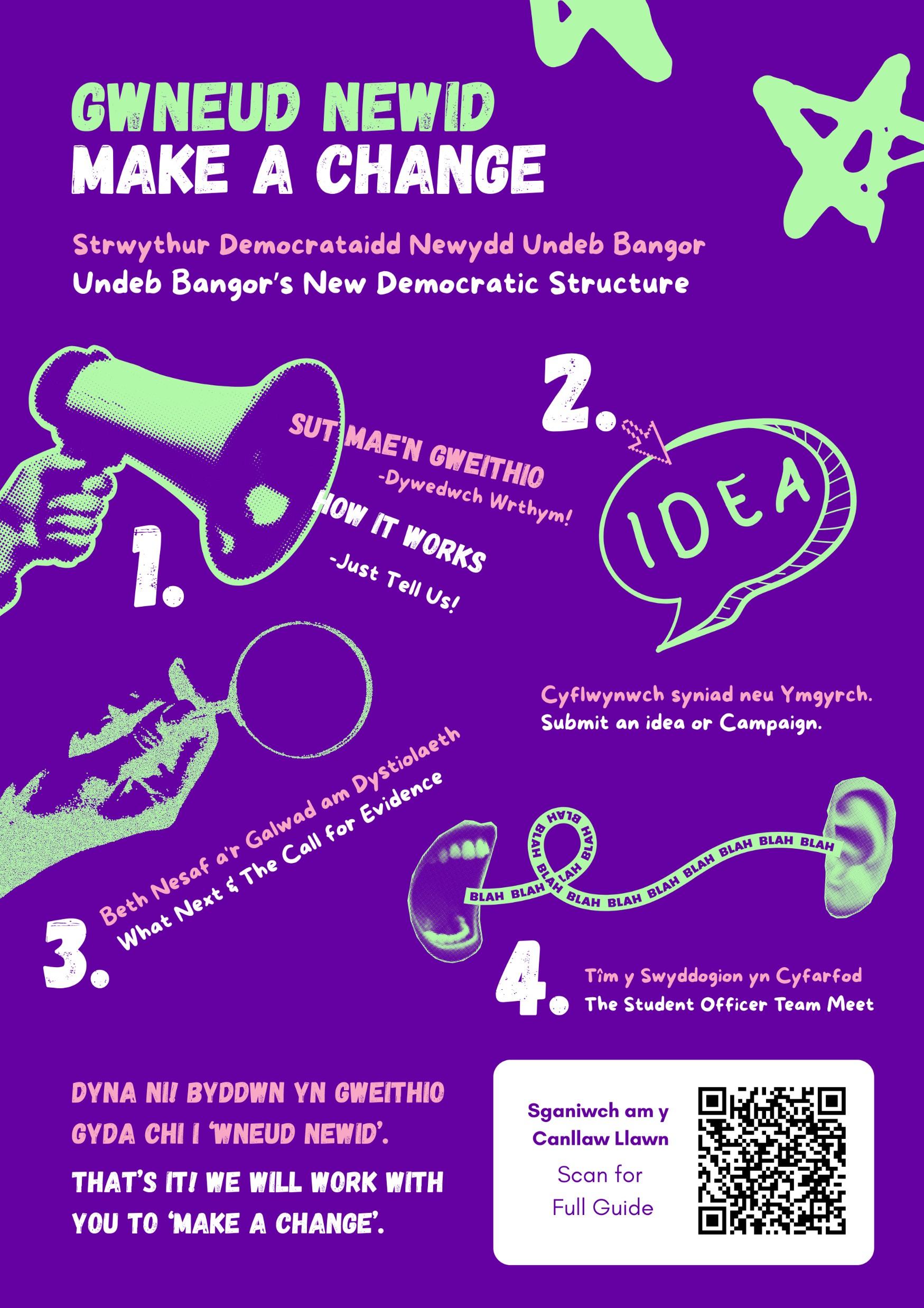

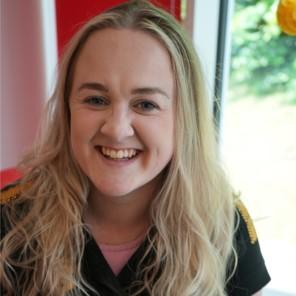

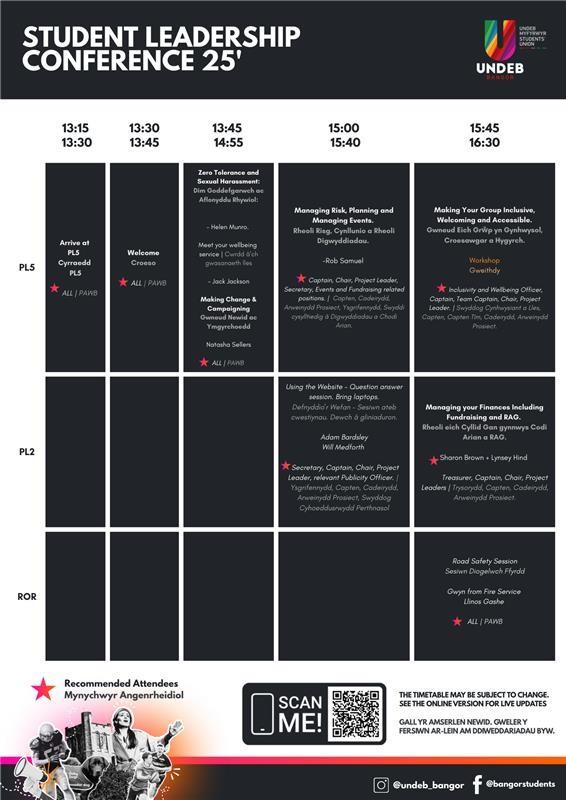



Rheoli Risg, Cynllunio a Rheoli Digwyddiadau. Managing Risk, Planning and Managing Events.




Hazard: A hazard is anything that may cause harm eg. chemicals, electricity, working from ladders, driving, undertaking social surveys [another word for Hazard could be Danger].
Harm: Injury or illness.
Risk: Is the combination of the likelihood, great or small, of someone being harmed by the hazard and the consequence/severity of that harm should it occur.
Control: what we do to make it safer.
Reasonably Practicable: Weighing up the cost versus the benefit ie. evaluating the risk against the trouble, time and money needed to control it.

Perygl: Perygl yw unrhyw beth a all achosi niwed ee. cemegau, trydan, gweithio o ysgolion, gyrru, cynnal arolygon cymdeithasol [gallai gair arall am Hazard fod yn Beryglon].
Niwed: Anaf neu salwch.
Risg: A yw’r cyfuniad o’r tebygolrwydd, mawr neu fach, o rywun yn cael ei niweidio gan y perygl a difrifoldeb y niwed hwnnw pe bai'n digwydd
Rhesymol Ymarferol: Pwyso a mesur y gost yn erbyn y budd h.y. gwerthuso’r risg yn erbyn y drafferth, yr amser a'r arian sydd eu hangen i'w reoli.







Step 1 – Identify the Hazards.
Step 2 – Decide who might be harmed and how.
Step 3 – Evaluate the risk and identify controls.
Step 4 – Record your findings.
Step 5 – Review your risk Assessment.
Cam 1 – Adnabod y Peryglon.
Cam 2 – Penderfynwch pwy allai gael ei niweidio a sut.
Cam 3 – Gwerthuso’r risg a nodi rheolaethau.
Cam 4 – Cofnodwch eich canfyddiadau.
Cam 5 – Adolygwch eich Asesiad risg.


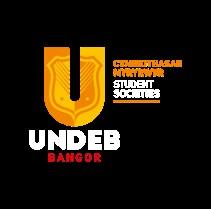
https://www.bangor.ac.uk/hss/documents/RA1-CarryingOutaRiskAssess mentOct17.pdf



https://www.bangor.ac.uk/hss/documents/RA1-CarryingOutaRiskAssess mentOct17.pdf What are the consequences/harms? What are the controls?


What are the consequences/harms?
Skipping a lecture – could lead to:
• Falling behind
• missing content
• lower grades
• attendance concerns
• stress, missed information
• not meeting group work responsibilities
What are the controls?
• Ask a friend for notes.
• Catch up on the lecture recording or slides.
• Email the lecturer with key questions.
• Keep an eye on Blackboard announcements.
• Plan ahead (only skip if it won’t clash with assessment prep).
• Don’t make it a habit — occasional, not regular.



https://www.bangor.ac.uk/hss/documents/RA1-CarryingOutaRiskAssess mentOct17.pdf












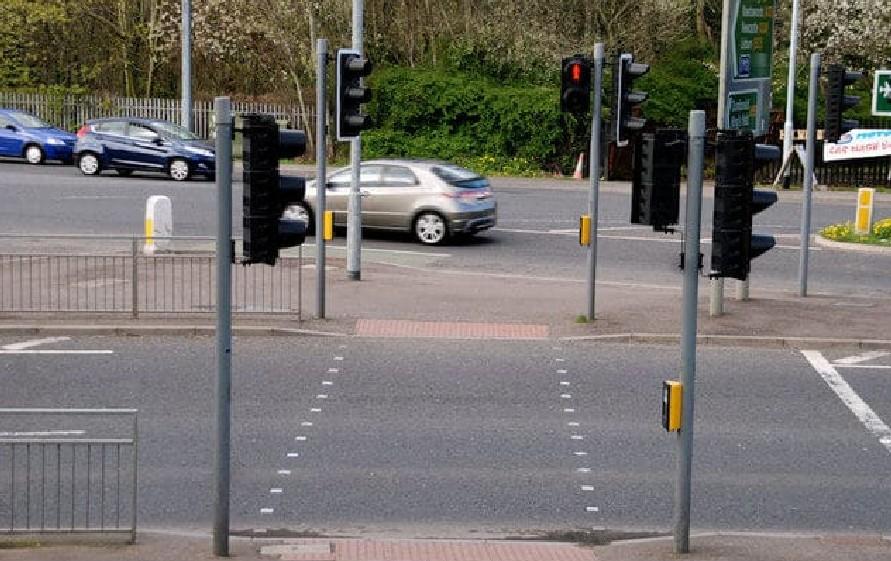


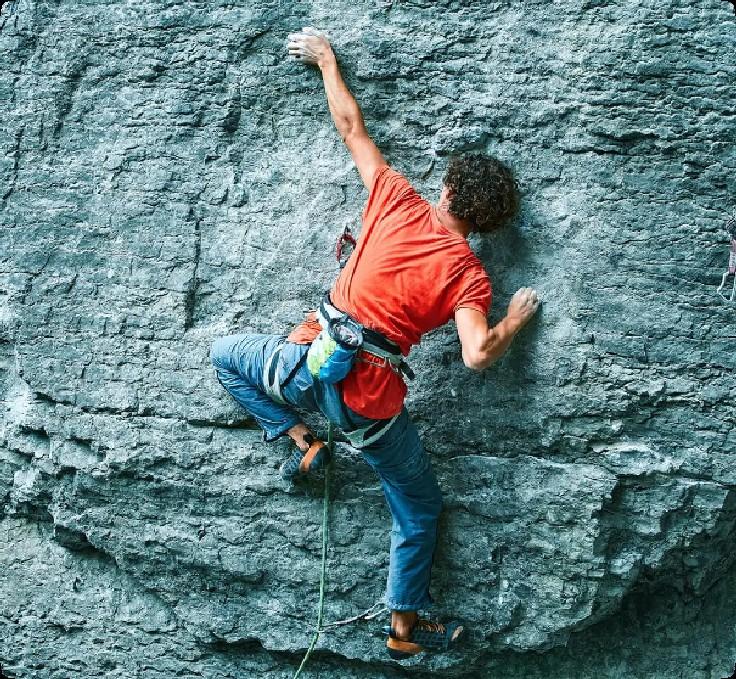





1. The rugby posts – during a game or training people may collide with the posts. This could cause bruising, head injury and/or broken bones.
Any people playing the game. Cushioned pads available to put around the base of posts. a.Group organiser to ensure that pads are fitted to posts prior to training and games. a.Before each game / session




1. Falling rocks from crag – any falling rocks could cause an injury whist climbing or belaying. This could result in head injury, bruising, broken bones.
Any people climbing or belaying.
The clubs has climbing helmets which are inspected each year.
All members are briefed that they must wear helmets whilst belaying and climbing.
Standard briefing document produced.
Nobody is allowed to participate without using a helmet.
Damaged helmets are retired.
a. Ensure that helmets are inspected each year.
b. Group leaders to brief those at the crag to wear helmets.
c. Group leaders to monitor use of helmets.
d. Group leaders to report any damage to helmets to SU
a. August each year.
b. At the beginning of each session
c. Throughouth sessions
d. After each session




1. Tea urn – when on, the tea urn will be very hot. This could cause burns and scolding.
Hot water could also be spilt causing burn injuries and damage to furniture, fixtures and fittings.
Any cables from the tea urn could be tripped upon. This could cause injury such as bruising and also burns if the tea urn is pulled over.

Any person using the tea urn.
People in the vicinity of the tea urn Fixtures and fittings.
“Caution Hot” signs are available to put by or on the tea urns.
All tea urns have lids.
Paper towels are available to wipe up any spills.
a. Group leader to ensure the tea urn is placed on a study surface.
b. Cables will be kept tidy and out of the way. This will be monitored by the group leader.
c. People using the tea urn are reminded that it is very hot.
a. When setting up
b. Setting up and throughout event.



• Complete a Risk assessment for any event that is outside your regular activity.
• Submit Risk assessment to the SU for approval.
• Please don't let his put you off!
• Ask for support from the SU.
• Risk Assessment should be shared to all members.
• Cwblhewch asesiad risg ar gyfer unrhyw ddigwyddiad sydd y tu allan i’ch gweithgaredd arferol.
• Cyflwyno asesiad risg i'r UM i'w gymeradwyo.
• Peidiwch â gadael iddo eich digalonni!
• Gofynnwch am gefnogaeth gan yr UM.
• Dylid rhannu Asesiad Risg i bob aelod.




Have comprehensive documentation which covers health and safety requirements.
Have detailed emergency procedures and action plans for all activity.
Have detailed and specific risk assessment for all activities.
Provide detailed reports and evaluations of incidents.
Have documented equipment safety inspections.
Regularly check and maintain all equipment, ensuring record keeping.
Have an accurate inventory of all equipment which is shared with the Students’ Union.
Have first aiders at activity sessions.
Meet with the Students’ Union Opportunities team at the beginning of each semester.
Ensure relevant committee members attend any health and safety training or information sessions the Students’ Union provides.
Have a designated safety officer.
Have suitably qualified or competent coaches/instructors to conduct activities, where required.
All paperwork must be submitted to the SU before activities can take place.
Have emergency procedures for activity.
Have specific risk assessments for all activities.
Report and evaluate incidents.
Have an accurate inventory of all equipment which is shared with the Students’ Union, with safety inspections recorded where relevant.
Have first aiders at activity sessions.
Committee members should attend any health and safety training or information sessions the Students’ Union provides.
All paperwork must be submitted to the SU before activities can take place.
Have basic emergency information and contacts.
Have access to first aiders and first aid kits.
Have risk assessments for activities.
Report incidents and conduct evaluations with the SU where relevant.
Committee members should attend any relevant information and training sessions the Students’ Union provides.
All paperwork must be submitted to the SU before activities can take place.
Any information relating to a living individual who can be identified by for example:
• Name
• Address
• Date of Birth
• Identification number
• Location data (mobile device collecting data on your location)
• Online identifier (e.g. Email, chat, instant messenger, Facebook)




Personal data relating to an individual’s:
• Racial or ethnic origin
• Political opinions
• Religious or similar beliefs
• Physical or mental health or condition
• Sexual life or sexual orientation
• Genetics
• Biometrics (where used for ID purposes)




• Protects personal data and privacy
• Gives people rights and protections
• all committee members who handle personal data have a responsibility.




• Data Collection:
• Collect data only for specific, legitimate purposes and ensure it's not used for other unrelated purposes.
• Only collect data that is necessary for your purpose. Avoid gathering excessive information.
• Consent:
• Obtain explicit consent from individuals before collecting their data. Ensure they understand why their data is being collected and how it will be used.




• Data Storage:
• Security: Make sure files are password protected and kept on groups Teams, paper records are typed up and destroyed securely
• Retention: Only keep personal data for as long as necessary for the purpose for which it was collected.
Data Access:
• Access Control: Limit access to personal data to only those who need it for their role within the club or society.
• Data Sharing: Be cautious when sharing personal data – ask the SU!




• Transparency:
• Privacy Notices: Provide clear information to individuals about how their data will be used, including who will have access to it and how they can exercise their rights.
• Make sure people can request be removed from your data.
Example privacy notice for when using undebbangor.com mailing function:
‘You are receiving this email because you are a member of Undeb Bangor’s XXXXXX Society, to keep you up to date on the events and opportunities you are entitled to as a member of our group. We won’t share your data with anybody else and we’ll only use it to deliver your membership benefits (we won’t send you spam!). If you no longer want to receive these emails, please let us know.’

• Data Breaches – let us know straight away!




Key things to think about:
• Event Lead/Manager – who is ultimately in charge?
• Objective – what is the purpose of your event?
• Event plan – have you got a jobs/tasks list?
• Stakeholders – Who do you need to let know?
• Money – have you got a budget? How much will it cost?
• Rooms – what space will you need? Book it.
• Transport – you may need to get things booked in.
• Risk Assessment – evaluate the risks
• Event plan for the day – think about a running order, rota, timetable





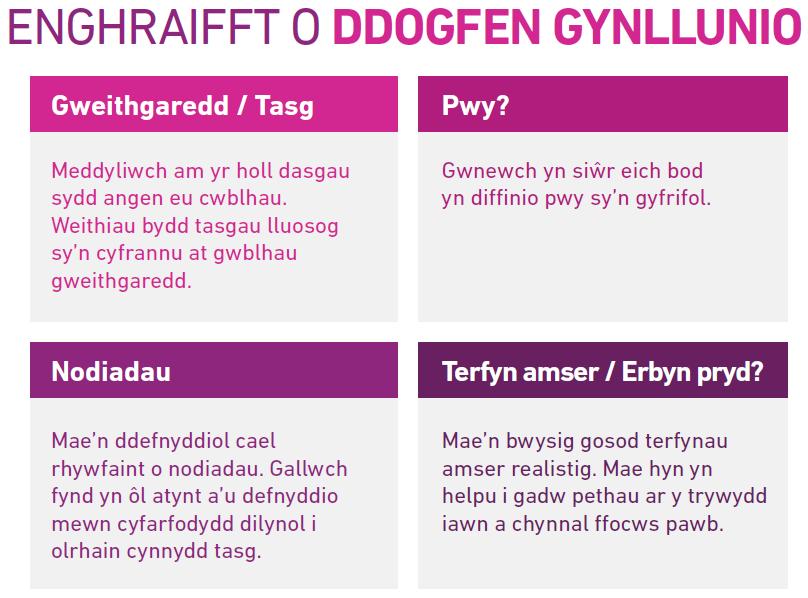








Er eich bod yn rheoli'r prosiect, nid oes angen I chi gwneud pob tasg
Just because you are project managing doesn’t mean you have to do all of the jobs




Plan:(Small event 4-6 weeks notice, Large event 2-3 months);
• Book Venue
• Complete project plan
• Complete activity Risk Assessment
• We will work with you and support you as much as possible.
• For All events everyone has responsibility to make sure everyone's safe.


Cynllun: (Digwyddiad bach 4-6 wythnos o rybudd, Digwyddiad mawr 2-3 mis);
• Lleoliad Llyfrau.
• Cwblhau cynllun prosiect.
• Cwblhau Asesiad Risg y gweithgaredd.
• Byddwn yn gweithio gyda chi ac yn eich cefnogi cymaint â phosibl.

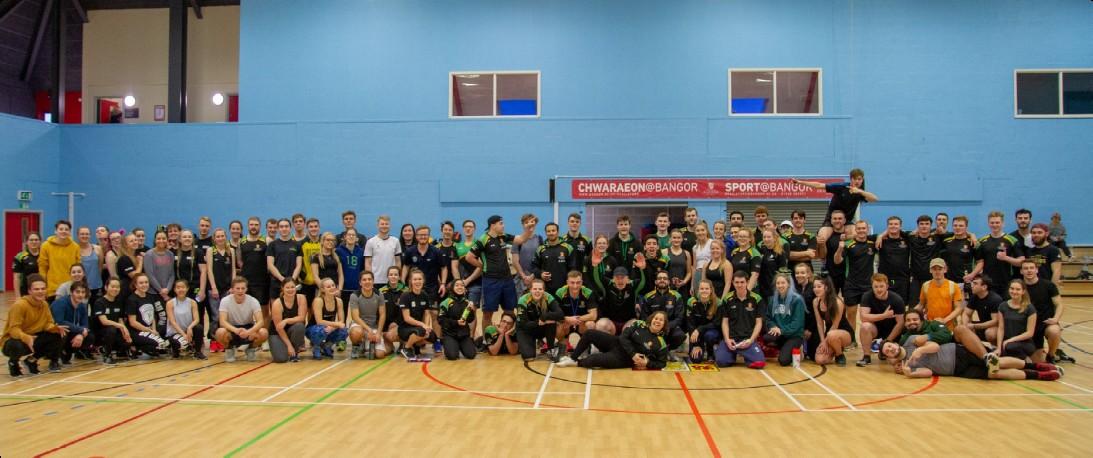
• Ar gyfer Pob digwyddiad mae gan bawb gyfrifoldeb i sicrhau bod pawb yn ddiogel.




Bake Sales
• Food must be labelled with all ingredients.
• Only served food that can be served at room temperature.
• Never serve food that needs heating or to be kept chilled/frozen.
• Once prepared store and transport cakes etc. in clean, sealable containers.
BBQ
• Food hygiene level 2 required for all hot dishes cooked at an event.
Gwerthiannau Pobi
• Rhaid labelu bwyd gyda’r holl gynhwysion.
• Dim ond bwyd y gellir ei weini ar dymheredd ystafell.

• Yn Peidiwch byth â gweini bwyd sydd angen gwres neu sydd i’w gadw’n oer/rhewi
• Ar ôl eu paratoi storiwch a chludwch gacennau ac ati mewn cynwysyddion glân y gellir eu selio.
Barbeciw



• Mae angen lefel 2 hylendid bwyd ar gyfer pob pryd poeth sy'n cael ei goginio fel digwyddiad.
https://my.bangor.ac.uk/hss/inflink/cakesatcharityevents.php.en






• Master’s linguistics student
• Autism, ADHD, Dysgraphia, Sensory Processing Disorder, Hard of Hearing, Keratoconus.
• Run accessibility training for the SU
• Do not be afraid!
• It’s far better to ask a question and get the words slightly wrong than to leave with unanswered questions.
• What an inclusivity officer does
• The importance of an inclusivity officer
• Ways to make your society more accessible
• Serendipity specifics
o Quiet rooms
o Quiet hours
1. We don’t have any disabled people in our society
• An inclusivity officer is not just there for disabled people. They are there for anyone who needs it:
o Women
o LGBT members
o people with mental health conditions
o mature students
o international students
o anyone else who may need it
Part 2: We don’t have any disabled people in our society
• The UK parliament estimates that 70-80% of disabilities are hidden. You might well not know which of your members or prospective members are disabled.
• Proactive vs reactive accessibility and inclusivity
2. Well, I think we already do a pretty good job
Just because you are not aware of the ways in which your society can be made more inclusive and accessible does not mean that your society has nothing to improve.
Every society will have issues. If you can’t see them, it just means that you’re fortunate enough to not be affected by them.
o E.g. If you’re not deaf it mightn’t occur to you that the videos that your society puts out need captions.
You don’t know what you don’t know.
3. That’s woke
• The idea that everyone being able to access a society or club with equal ease is bad comes from people who don’t understand that not everyone has it as easy as them in life
• If you’re not aware of the issues that other groups face you can easily assume that everyone experiences the world like you do; adjustments for other people can therefore seem like they’re getting an unfair advantage.
Why you don’t need an inclusivity officer
4. We do sport at a high level- that will decrease if we have to let everyone in.
• No one is saying that you can’t require a certain level of ability for people to be on your sports team.
• An inclusivity officer can make sure that everyone who is at that level gets an equal chance to try out.
o E.g. Autistic ice-hockey player. Really good at ice-hockey but terrified of going to try-outs because s/he knows the reputation of ice-hockey teams and their initiations, and he's petrified of what might happen to s/he or what s/he might be made to do.
o Throw the ball at the target
o All the time you couldn’t see the other person’s target. It seemed unfair that I moved their target a lot closer.
o But once you turned around you could see that your targets are now the same distance apart
o Try and think of things from other people’s perspective
• Make your society as inclusive and accessible as possible.
o Making sure that the buildings and rooms you use are wheelchair accessible
o Making sure that people feel safe leaving your socials in the eveningsE.g. offering a walking bus to Ffriddoedd
o Make your society as inclusive and accessible as possible.
• Helping new members to feel settled and welcome in your society
o E.g. running a quieter social just for new members
o Messaging new members to invite them to training or society meetings, so they feel less anxious about going.
• Going out of your way to include people rather than just sitting and chatting with your friends.
• Ensuring that your society or club offers a range of socials- not just loud busy pubs.
o Even if you tell your members that they are not obliged to drink, there will be people who cannot cope with being in a pub, whether that’s because of history of addiction, sensory issues with it being too loud or crowded, anxiety, or whatever else.
• Making sure that posts announcing socials or weekly meetings are accessible- more on this later
• Making sure that information is put out about the accessibility of your society so that people know they can attend and will be welcome there.
• Ensuring that your society puts information out by email, as well as social media- as not everyone has social media
• Making an effort to include mature students and international students in every part of the society.
• Making sure that deaf and HoH people can get as much out of your society as possible
• Making sure that bling and visually impaired people can get as much out of your society as possible
• Updating members if anything changes with regard to your accessibility
• Making an accessibility guide for your society
• an inclusivity officer isn’t just a cute little extra.
• It’s an integral part of your committee, with the same workload as a treasurer or a secretary.
• It’s not just a box to tick. If done well, the role can really improve people’s experience if your society or club, and in some cases, whether they get to experience your society or club at all.
• Reactive accessibility: We will wait for a disabled person to tell us about the problems they are experiencing with our system and then try and find a solution
o E.g There’s a step outside the room where you meet so I can’t get in in a wheelchair
• Proactive accessibility: We will think ahead to make sure that our system doesn’t cause problems for disabled people.
o Before we started meeting for the year, we found a room with step free access so that anyone in a wheelchair could join if they wanted
• Disabled people often have to do rigorous planning in order to make sure that a meeting/social/event is accessible to them.
• One of the most freeing things is knowing that a place is completely accessible so that you can decide to turn up spontaneously if you want.
o E.g. Deciding to go out to a restaurant and just being able to go, rather than having to spend time phoning round different places to find one which is wheelchair accessible.
o Knowing in advance what activities the society has planned so you don’t have to spend hours mentally preparing for the unknown
• "Hi guys, we were thinking that we might meet up at Skerries later this evening”
• Now let's look at some potential problems:
1. You haven't said whether you are meeting there or not so I don’t know if there will be anyone there if I turn up
2. I don’t know where Skerries is and I'm worried about turning up to the wrong place
3. I don't know if Skerries is wheelchair accessible
4. You haven't said what you'll be doing, the uncertainty makes me anxious
5. I don't drink, I don't want to be made to drink.
6. I don't know how long it will last, or if I'll be allowed to leave early
7. I can't cope in loud and busy environments, what if it's really crowded and loud
8. I'm worried about getting home by myself late at night
9.
I don't really know anyone at the club, what if no one speaks to me
10.What if people mock me for my disability
11.I don't know what to do when I arrive, where will they be, where do I go?
12.I'm too nervous to walk in by myself
• Now HOP!
• As you can see, all these extra uncertainties and stresses make it much harder for someone to attend a society.
• Now, let’s make this announcement a bit more accessible
Announcements, made accessible Hi guys, we will be�� meeting in The Skerries at 7pm�� this evening to have a relaxed evening chatting together��. Skerries is a pub at the end of the high street near the pier [insert address]�� Some people will be drinking but you don't have to drink if you don't want to��. Skerries is a small pub and it should be fairly quiet��. It’s wheelchair accessible��. We will be there until about 11pm but you can leave at any point��. If anyone needs help getting there we will be meeting outside bar uno on ffriddoedd village at 6:30 and you can walk down with us��. When you get to Skerries we will be sat at one of the tables by the windows��. If you're worried about getting home afterwards we can arrange for someone to walk back with you to Ffridd, St Mary's, or the high street��. We're a friendly society and we'd love to get to know you. If you have any questions, you can contact our inclusivity officer [insert name] on/at: ��
• All the same principles we’ve just covered for making an accessible social announcement can be applied to the announcements for your weekly meetings.
• Some things to remember
o Do an announcement every week, so that people know that you are definitely meeting that week
o Give a quick overview of what will be happening in the session so that people can prepare
o Put your announcements out via email as well as social media.
o Include a contact for the inclusivity officer so that people can ask any questions they may have before coming along
• Making your society accessible and inclusive isn’t just about doing the minimum so that people can come along.
• All the different faces and voices you have in your society have a lot to contribute
• E.g. The autistic ice-hockey player from our earlier analogy.
• If you want to create an inclusive atmosphere, you need lots of individual examples of accessibility/accessible features
o E.g. I run an “inclusive café”-
o I have menus with braille on
o I can dim the lighting if people need
o I have allergens clearly labelled and allergy friendly food
o I have full wheelchair access and tables which can fit wheelchairs
o I have an accessible bathroom
o I have a place outside for guide dogs to use the bathroom.
• If something isn’t accessible for everyone then it isn’t inclusive
• Serendipity will have a number of accessibility features which you need to know
o A quiet room
o A quiet hour
o A sticker system
• A quiet hour is an hour when serendipity will be much quieter and calmer
• Not everyone can go to serendipity in the usual very busy times
o CEV (clinically extremely vulnerable)
o Hard of Hearing/Deaf
o Wheelchair users
o Autistic
o Anxiety
o Mental health
• On the following slides you will see a statement
• There will be 3 possible answers
• A- stand on the left of the room
• B- stand on the right of the room
• C- come to the front
A. Yes
B. Yes, but only if it’s played quietly
C. No
A. Yes
B. Yes, but only if it’s played quietly
C. No
A. No
B. Yes
C. Yes, as long as you’re not in anyone’s way
A. No
B. Yes
C. Yes, as long as you’re not in anyone’s way
Can I come to the quiet hour if I’m not disabled?
A. No, it’s not for you
B. Yes absolutely, but if you don’t need it try and leave space for those who do
C. Yes, it’s just like a normal hour but a but quieter
Can I come to the quiet hour if I’m not disabled?
A. No, it’s not for you
B. Yes absolutely, but if you don’t need it try and leave space for those who do
C. Yes, it’s just like a normal hour but a but quieter
A. Yes, there aren’t many people there anyway
B. No, disabled people deserve to have the same level of effort put into their experience as everyone else
C. No, but it’s fine if you’re not fully set up then
A. Yes, there aren’t many people there anyway
B. No, disabled people deserve to have the same level of effort put into their experience as everyone else
C. No, but it’s fine if you’re not fully set up then
Do I need to remind people to be quiet in the quiet hour?
A. No, there are people from the SU who will do that
B. Yes, one person per stall should be in charge of keeping it quiet
C. Yes, if it gets too loud near you then politely remind people to be quiet
Do I need to remind people to be quiet in the quiet hour?
A. No, there are people from the SU who will do that
B. Yes, one person per stall should be in charge of keeping it quiet
C. Yes, if it gets too loud near you then politely remind people to be quiet
• Announcements 30, 10, and 1 minute before it starts
• Turn off your music
• Don’t shout
• Lights will be dimmed
• Don’t play with sports equipment
• Reduce the sensory level of your stall
o Fewer people
o Less clutter
o Reduce strong smells
• A quiet room is a purposefully designed room away from the main hall where people can go if they need a quiet space
• It is not
o Somewhere to make phone calls
o A hangout room
o A place to just kill time
• Available all day at serendipity
• In one of the squash courts
• Accessible from the side of the hall
• Should have
o Seating
o Fidget toys
o Table
• At serendipity there will be a sticker system
Dark blue Triangle
Do not wish to interact, let me look at the stall without conversation, do not ask to help
Yellow Square Only talk to me if I approach you first
Lavend er Circle Happy to talk and be approached
• How many of the sports clubs at Bangor are accessible to wheelchair users?
• How many sports clubs publish information on autism accessibility?
• How many sports clubs publish any information on their accessibility?
• Does the SU currently publish any information on the accessibility of its sports clubs and sports facilities?
o Especially important now that fees are being introduced
• “I cannot say for certain as I’ve never felt comfortable enough to approach any sports clubs and they’ve never advertised any opportunities or been outwardly open to the idea of disabled people joining”
• “I’m sure some of them are probably friendly and accommodating but it’s intimidating when there is no evidence that they’ll take you seriously/be friendly”
• Counterintuitive?
• The reality of the accessibility situation will not change if you tell us what you don’t have.
• Give a full, accurate picture of the accessibility situation
• It allows us to conserve our energy and better plan what we go to, so we don’t end up turning up to things which we can’t properly experience or attend.
• Reality vs Optics
• One stop shop for accessibility information about serendipity
• Introduction to what your society is
• Explain the sport/the society
• When and where you meet
• How to get there (via public transport, on foot/wheelchair, or in a car)
• How many people in a typical session
• What time do you meet?
• Where do you meet?
• How do I get there (walking and public transport directions?
• Is there accessible parking nearby?
• Is there an accessible toilet in the building?
• Is there a hearing loop in the building?
• Is your meeting place wheelchair accessible?
• Do I have to come to ever session?
• Do I have to stay for the full duration of a session?
• What happens in a typical session?
• How many people do you usually have in a session?
• Can I bring food with me?
• Are you able to accommodate people with severe food allergies?
• Do I have to pay to attend?
• Is there any equipment I need to buy before joining?
• Is your society welcoming of disabled people?
• Is your society welcoming of autistic people?
• Are your socials wheelchair accessible?
• Are your socials autism accessible?
• How can I get in contact with you?
• How will you contact me as a member?
• How can I join the society?
• What do I need to bring with me when I come?
• Not every committee member for your society is here today
• You need to tell the rest of your committee about what you have learnt today, so they are all aware

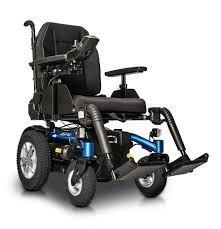

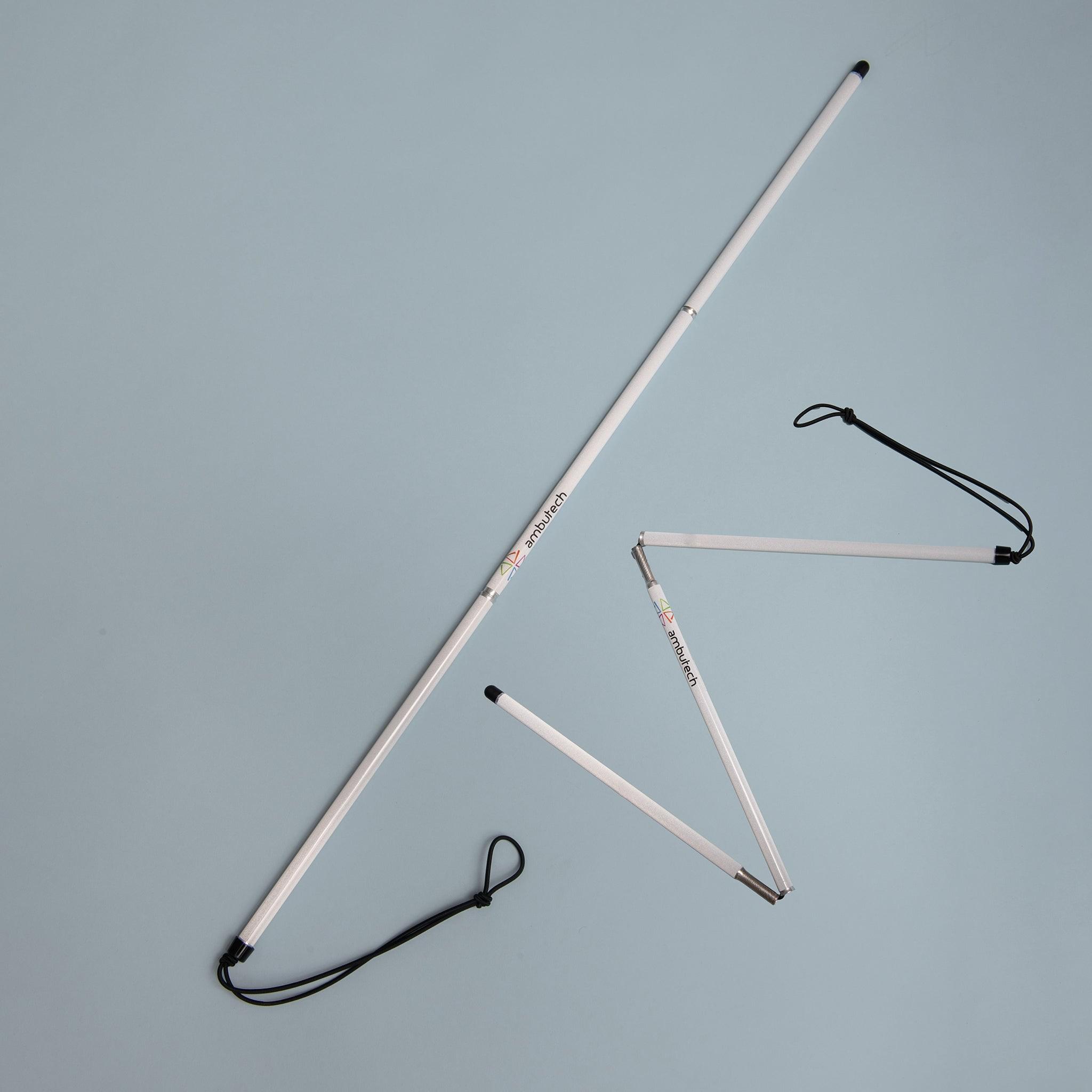






• Do not touch someone’s disability aids without their permission
o They are medical equipment, not toys
• Do not push someone’s wheelchair if they haven’t asked you to
• Do not pet or distract an assistence dog which is working
• Speak directly to the disabled person, not the people with them
• Don’t infantilise disabled people

Cynhadledd Arweinyddiaeth Myfyrwyr 2025
Student Leadership Conference 2025
19/09/2025